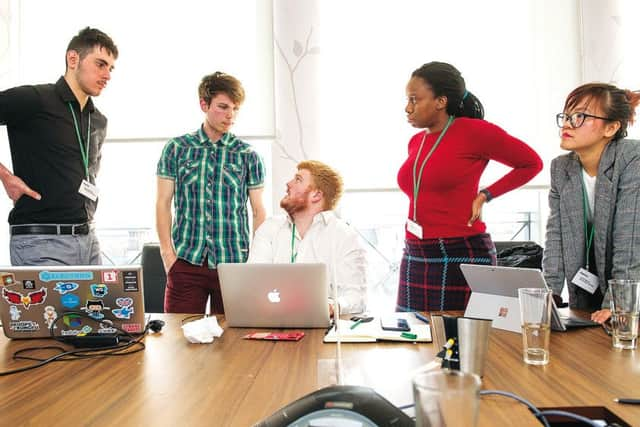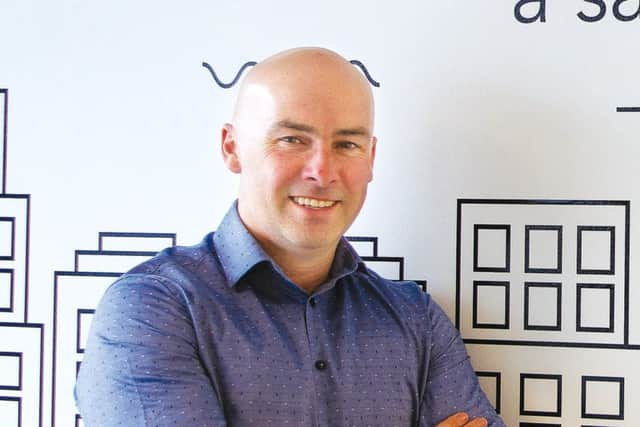How Scotland's new banking sector is developing a social conscience


Now, one of the main players in Scotland’s fintech revolution believes his sector should step up to the plate to deliver better financial services to those in similar situations through a “fintech for good” agenda.
Kent Mackenzie, director and head of fintech at business consultancy firm Deloitte, says: “If Edinburgh is to be the data capital of Europe, we must use this as a platform to create and build solutions that can help some really important issues.
Advertisement
Hide AdAdvertisement
Hide Ad“These might include low levels of financial inclusion, a lack of financial education and awareness and help to structure a broader support network for marginalised communities such as the homeless, or support in reducing mental health issues caused by a lack of assistance for some people struggling to manage their finances.


“Working in the finance sector, it is fairly easy for me to manage my family’s finances with clarity – but across society that is not often the case.
“Managing finances or understanding how credit, insurance or pension products work can be really challenging, which puts a huge amount of unfair pressure on people juggling family finances and worrying about their future.
“I think fintech has an opportunity and a role to play to help people understand and manage their finances in a far more empathetic way.
“If we can do this, I’m pretty confident we’ll see an improvement in certain areas of society and in broader mental health.”


As part of DataFest 2018, Deloitte hosted a Datathon (an advanced hackathon) to focus on this topic.
“We accessed more than 50 open data sources from places like the World Economic Forum and UK or US government information on mental health, spending, demographics, etc, then coupled this with anonymised and dummy banking data,” says Mackenzie.
“From this, the Datathon teams were able to draw insights and start thinking about how to design apps or solutions to help relieve pressure points experienced by many when managing their finances.”
Budgeting
Advertisement
Hide AdAdvertisement
Hide AdMackenzie describes a range of “nudge” type solutions, where budgeting apps can help free up small amounts to be moved automatically into savings accounts, and machine learning solutions to make sense of complex terms and conditions and present them in a clear way.
“These prototypes were created in 48 hours and have real potential. Imagine the difference a fintech could make if they really put some focus and funding into this space,” he says.
Mackenzie has lobbied hard to leverage advances in fintech and data to promote financial inclusion.
“My view is that access to basic financial services is a human right.
“That might be offering access to the simplest form of bank account or helping people save for the future of their family in a safe place.
“It could be the ability to have a pension, irrespective of how little it is, or insurance.”
Stephen Ingledew, chief executive of FinTech Scotland, agrees, saying: “There is a real opportunity to include those people who have been excluded from financial services in terms of access to credit and loans. Companies like Gigly and Castlight Financial are doing very valuable work in this area.”
Gigly provides financial services to those working in the gig economy who might not meet a more traditional bar, such as a regular income, to qualify for credit or loans.
Advertisement
Hide AdAdvertisement
Hide AdMackenzie sees a real sense of social purpose across the fintech community: “Castlight is a fantastic example of an ethical, focused business with a strong moral compass in the way it is trying to open up financial services to more people, making sensible decisions based on strong data.”
He explains: “It’s understanding the data we have available and having that big picture about an individual.
“Connected cities, cars, homes and the ‘internet of things’ means data is being spat out everywhere.
“You can use it to augment a far richer view of individual circumstances to ensure products and services are tailored for them, then served up in the right way.
“This data will also alert companies about how people consume information, and how they feel and react, meaning we can make products and services far more accessible to certain segments of society and far less stressful to consume.”
One area that Mackenzie feels needs attention and focus is the creation of financial products for homeless people: “How can we do something similar to what Social Bite has done?
“I don’t have all the answers but there’s something about the ease of access to technology we have now, combined with the rapid proliferation of data and the rise of social enterprise and a broader social conscience.
“We can verify identities via phones, based on selfies and basic biometrics and open up access to financial services.
Advertisement
Hide AdAdvertisement
Hide Ad“You can serve in the data via smart technology and get an offer back [to open a bank account, or get a loan, for example] via your mobile phone and you don’t have to go into a branch.
“That sets the scene for fintech businesses to come in and get their arms around this agenda.”
Mackenzie understands this agenda needs to be pursued carefully, under the close guidance of General Data Protection Regulation, but thinks the opportunities are significant.
“At its heart, the core principle of clear customer consent to their data being used must be upheld.
“That doesn’t stop fintech: it – very sensibly – puts control around it and ensures people’s data is respected.”
Mackenzie also describes interesting work going on in fintech around emerging financial distress
“At Deloitte, we’ve created a behavioural and emotional analytics tool (BEAT) using artificial intelligence to monitor voice calls in real-time – not only to detect potential mis-selling, but also to identify where emerging distress might feature during a customer call,” he says.
“The organisation is able to spot this immediately and make the appropriate intervention to support the customer.
Advertisement
Hide AdAdvertisement
Hide Ad“It’s gathering traction in banking and insurance – to drive business improvement and put the customer’s interests at the heart of every call.
“We need to be able to pick up distress and understand that people sometimes just need a minute to understand what is being said.
“The bank’s script can sometimes baffle, confuse and cause anxiety rather than help the customer in an empathetic and effective way.
“Can the fintech community unpick that and make the relationship a little bit easier for people who need a bit more help and understanding?”
Mackenzie says: “There is no blame here – what I am saying is that this should be a watershed moment, we should be using data and fintech ‘for good’ to recognise and help people.
“I see real progress across many sectors to create a socially astute, caring economy, it’s a new world order and financial services has to follow suit. We owe it to society and the people we share this planet with.”
Dr Ramona Blanes, a lecturer in international business and services at Glasgow University, is also convinced that fintech can be a force for positive social change.
Reflecting on a recent visit to Indonesia, she says: “I see reverse innovation from developing countries; they are looking at fintech very much as a social good to tackle inequalities and bringing that mindset back over here.”
Advertisement
Hide AdAdvertisement
Hide AdShe believes fintech can tackle global problems such as access to safe and affordable energy.
A graduate of the university’s Adam Smith Business School, Eunice Ntobedzi, has set up EmPowered FinTech in Botswana and the first pilot scheme will run later this year.
It aims to provide safe, renewable energy and simple, affordable payment schemes to people who have not traditionally accessed either financial services or safe energy.
It’s about lending and borrowing responsibly
Phil Grady’s eureka moment came while watching a television news bulletin with his ten-year-old son.
“It was a report on yet another financial crisis and an analyst described the financial markets as being driven by greed and fear,” the chief executive of Castlight Financial recalls.
“My son said, ‘I thought greed and fear were bad things, so why are they so important?’ It took a ten-year-old to make me realise, ‘This is nuts’.
“I’d worked in personal insolvency and I saw how people affected by bankruptcy also had serious health issues.
“I thought there had to be a better way to buy and sell financial services, based on real affordability.
Advertisement
Hide AdAdvertisement
Hide Ad“We looked at the market, there was nothing there, so we set up Castlight with a mission to create a safer financial world.”
The company is based on using relevant, up-to-date information to make real decisions: “It’s not about stopping lending and borrowing,” Grady stresses.
“It’s about lending and borrowing responsibly using high-quality data.”
Castlight partners credit bureaux to obtain current credit and bank data.
“The current system is insane; your credit rating sits there for six years, so you might be refused credit even if you won the lottery last week.
“And you might have a good credit rating but not be able to afford a certain loan because of your current financial position,” says Grady, above.
“Our Affordabilty Passport looks at the current financial position – real income, real expenditure and real affordability.
“What is manageable? How can we stop people going into acute debt – or at least flag up a problem at a much earlier stage?
Advertisement
Hide AdAdvertisement
Hide Ad“Castlight is about better, faster and fairer decisions – and it works for both consumers and banks.
“When we took the idea to the banks, they just said, ‘Wow’.
“In one case, we have reduced mortgage approvals from six weeks to about ten minutes.”
Open banking has allowed Castlight access to far more data and to make those real-life decisions – but Grady sees a deeper cultural shift.
“We set up in a spirit of truth and transparency to counter greed and fear.
“I’m optimistic because I think the banks and the credit bureaux are starting to see it.
“It’s not in the banks’ interest to lend money to people who might not be able to pay it back.
“If we all work together, we can deliver a much more sensible system that works for all of us.”
Advertisement
Hide AdAdvertisement
Hide AdCastlight is a profitable business which has grown organically and now employs 25 people in Finnieston, Glasgow – but it’s not just about growth.
“I don’t want to sound too hippy-ish, but it really is about changing people’s consciousness to create a safer financial world,” says Grady.
“If we can change that consciousness, the rest will follow.”